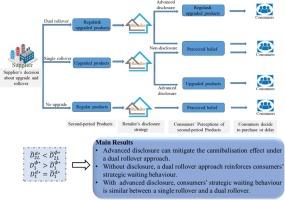Product upgrade and advanced quality disclosure in a supply chain
IF 6.7
1区 工程技术
Q1 COMPUTER SCIENCE, INTERDISCIPLINARY APPLICATIONS
引用次数: 0
Abstract
Retailers frequently preannounce the quality of upcoming products, highlighting the importance of information disclosure in supply chains. This study examines the interaction between advanced quality disclosure and product upgrades within a supply chain, where a supplier can release either upgraded products exclusively or alongside regular products in a subsequent period. Using a game-theoretical model, we investigate how the supplier’s upgrade decisions and the retailer’s disclosure strategy affect consumer behaviour, particularly strategic waiting, and product cannibalisation. Our results show that when only upgraded products are offered, the retailer discloses product quality in advance if the innovation level is high. When both regular and upgraded products are available, the retailer chooses advanced disclosure when the innovation level is either high or low. Even when the product improvement is minimal, advanced disclosure reduces cannibalisation and attracts more consumers to the upgraded products, thereby boosting the retailer’s profits. Additionally, the supplier may choose not to upgrade products when the innovation cost is moderate. These insights suggest that advanced disclosure can mitigate both cannibalisation and consumer waiting, particularly in high-tech industries or incremental innovation scenarios, such as electronics and smart home sectors, where the preannouncement of product information is crucial.

供应链中的产品升级和先进质量披露
零售商经常预先公布即将上市产品的质量,这凸显了供应链中信息披露的重要性。在供应链中,供应商既可以单独发布升级产品,也可以在随后的一段时间内与普通产品同时发布。本研究探讨了供应链中预先质量披露与产品升级之间的互动关系。我们利用博弈理论模型,研究了供应商的升级决策和零售商的信息披露策略如何影响消费者行为,尤其是战略等待和产品蚕食。我们的研究结果表明,当只提供升级产品时,如果创新水平高,零售商会提前披露产品质量。当同时提供普通产品和升级产品时,零售商会在创新水平较高或较低时选择提前披露。即使产品改进很小,提前披露也能减少蚕食,吸引更多消费者购买升级产品,从而提高零售商的利润。此外,当创新成本适中时,供应商可能会选择不升级产品。这些启示表明,预先披露可以减少蚕食和消费者等待,尤其是在高科技行业或增量创新场景中,如电子和智能家居行业,在这些行业中,产品信息的预先公布至关重要。
本文章由计算机程序翻译,如有差异,请以英文原文为准。
求助全文
约1分钟内获得全文
求助全文
来源期刊

Computers & Industrial Engineering
工程技术-工程:工业
CiteScore
12.70
自引率
12.70%
发文量
794
审稿时长
10.6 months
期刊介绍:
Computers & Industrial Engineering (CAIE) is dedicated to researchers, educators, and practitioners in industrial engineering and related fields. Pioneering the integration of computers in research, education, and practice, industrial engineering has evolved to make computers and electronic communication integral to its domain. CAIE publishes original contributions focusing on the development of novel computerized methodologies to address industrial engineering problems. It also highlights the applications of these methodologies to issues within the broader industrial engineering and associated communities. The journal actively encourages submissions that push the boundaries of fundamental theories and concepts in industrial engineering techniques.
 求助内容:
求助内容: 应助结果提醒方式:
应助结果提醒方式:


